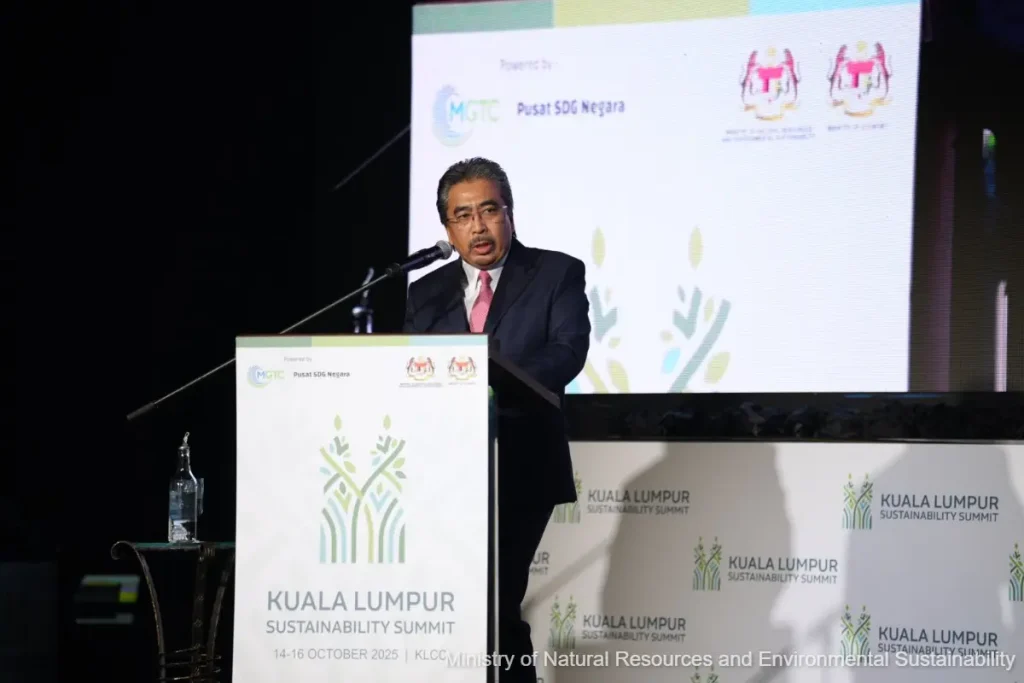
KUALA LUMPUR (14 Okt): Untuk mempunyai daya tahan iklim, lebih banyak pelaburan diperlukan, di samping reka bentuk semula infrastruktur kewangan, kata Menteri Perladangan dan Komoditi Datuk Seri Johari Abdul Ghani dalam ucaptama pada Sidang Kemuncak Kelestarian Kuala Lumpur (KLSS) 2025, yang diadakan di Pusat Konvensyen Kuala Lumpur.
Beliau berkongsi bahawa anggaran awal menunjukkan bahawa Malaysia memerlukan kira-kira AS$570 bilion (RM2.41 trilion) dalam pelaburan terkumpul dalam tempoh dua dekad akan datang untuk memenuhi matlamat iklim dan pembangunan jangka panjang. Sebagai perbandingan, Asean mempunyai matlamat kewangan iklim sebanyak US$422 bilion menjelang 2030 untuk memastikan daya tahan.
Beliau menambah bahawa instrumen inovatif, model pembiayaan gabungan dan kepastian dasar untuk keyakinan pelabur akan menjadi penting dalam memajukan agenda.
“"Walaupun skala pelaburan adalah penting, kos tidak bertindak adalah jauh lebih tinggi. Di seluruh rantau, kita sudah menyaksikan bagaimana perubahan iklim telah menjejaskan keselamatan makanan, harga tenaga, rantaian bekalan dan kesihatan awam," katanya.
“Oleh itu, tindakan iklim mesti sengaja disusun, disepadukan dan disokong oleh pembaharuan institusi untuk memastikan pembangunan negara boleh menjadi regeneratif dan inklusif.”
Panggilan ini selaras dengan keutamaan Pelan Hala Tuju Peralihan Tenaga Nasional (NETR), yang merangkumi kepelbagaian bekalan tenaga, pemodenan grid dan kecekapan dari segi permintaan.
Walaupun bertanggungjawab untuk hanya 0.69% pelepasan karbon global, Johari mengulangi komitmen Malaysia untuk membina strategi iklim negara yang boleh dipercayai dan boleh dilaksanakan.
Malaysia telah berikrar untuk mengurangkan keamatan karbon ekonomi sebanyak 45% menjelang 2030 dan ia telah mencapai pengurangan 37.1% dalam intensiti pelepasan karbon pada 2021. Trajektori ini berpandukan Pelan Hala Tuju Sumbangan Bertekad Nasional (NDC) yang dilancarkan awal Mei untuk mencapai sasaran pengurangan karbon negara.
“"Pelan hala tuju NDC menggariskan strategi sektoral dan laluan pelaksanaan. Lebih penting lagi, ia disokong oleh penjajaran institusi, memastikan peralihan iklim tidak terpencil daripada perancangan negara, dasar fiskal atau pembangunan industri," kata Johari.
Bagi mengukuhkan penjajaran ini, Johari berkata kerajaan sedang menyediakan Rang Undang-undang Perubahan Iklim Nasional (RUUPIN) untuk memberi kejelasan mengenai tadbir urus iklim, kewajipan pelaporan dan penyelarasan institusi.
Melengkapi ini ialah Dasar Pasaran Karbon Kebangsaan, yang juga sedang dibangunkan secara serentak untuk membimbing penubuhan kedua-dua pasaran karbon berasaskan pematuhan dan sukarela.
“"Setiap tiang ini, NDC, Rang Undang-Undang Iklim dan Dasar Pasaran Karbon, mencerminkan pendekatan bersepadu, telus dan berfokuskan objektif kami. Kemajuan Malaysia sedang berjalan tetapi hala tuju kami adalah jelas. Kami sedang mengukuhkan asas ekonomi negara kita, dengan daya tahan iklim sebagai terasnya," kata Johari.
Selain itu, Johari berkongsi bahawa Kementerian Perladangan dan Komoditi telah mengenakan undang-undang larangan penebangan hutan dalam sektor minyak sawit untuk memaksimumkan hasil, memupuk amalan pertanian mampan dan merangkumi pekebun kecil, sambil mengekalkan 5.7 juta hektar hutan sawit di negara ini.
Sumber: The Edge






